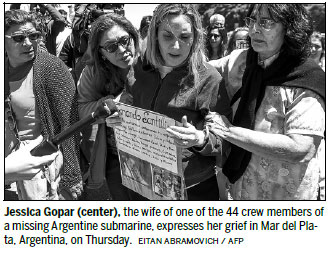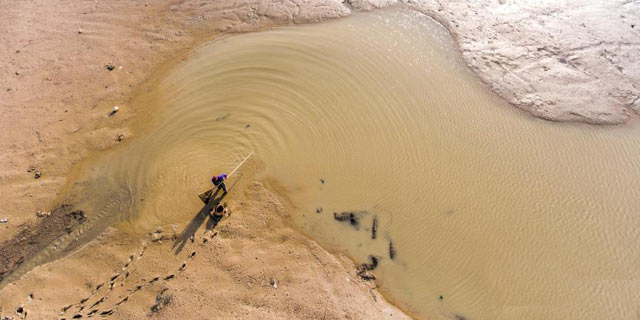'Explosion' dashes last hopes for missing sub
MAR DEL PLATA, Argentina - An explosion apparently occurred near the last known position of an Argentine submarine, the navy confirmed on Thursday, dashing any last hopes of finding the vessel and its 44 crew members.
Relatives of the missing sailors reacted with grief to the news after holding out hope since the sub was reported overdue at its Mar del Plata base on Nov 17, two days after the explosion.
"An anomalous, singular, short, violent and non-nuclear event consistent with an explosion," occurred shortly after the submarine's last communication, Navy spokesman Captain Enrique Balbi said in Buenos Aires.
Underwater sounds detected in the first days of the search by two Argentine search ships were determined to originate from a sea creature, not the vessel. Satellite signals were also determined to be false alarms.
The ARA San Juan, a 34-year-old German-built diesel-electric submarine, had reported a battery problem on Nov 15 and said it was diverting to Mar del Plata, but did not send a distress signal, according to the Navy.
Balbi admitted on Wednesday that the situation for the sub and its crew appeared to be worsening.
However, he refused to speculate at that point on the origin of what he initially described as a "hydro-acoustic anomaly" detected in the ocean almost three hours after the sub's communication and 50 kilometers north of its last known position.
Balbi said that information about the unusual noise only became available on Wednesday after being relayed by the United States and "after all the information from all agencies reporting such hydro-acoustic events was reviewed".
Explaining the lack of debris on the surface, Baldi said "nothing will end up floating to the surface" because a submarine "implodes".
Gustavo Mauvecin, director of the Center for Hyperbaric Medicine at Mar del Plata, said hydrogen "is always an issue with submarines with electric engines".
The San Juan "has 500 tons of lead-acid batteries, which release hydrogen if there is an overcharge in the battery, hydrogen in contact with oxygen is explosive".
Argentina is leading an air-and-sea search with help from several countries now including Brazil, Britain, Chile, Colombia, France, Germany, Peru, Russia, the US and Uruguay.
Russia was the latest navy to volunteer help, sending an oceanographic research ship as the operation shifted from rescue to recovery.
Afp - Xinhua - Ap

(China Daily 11/25/2017 page8)









